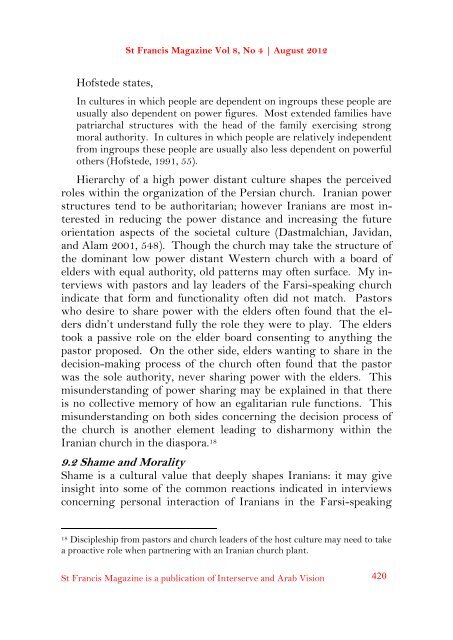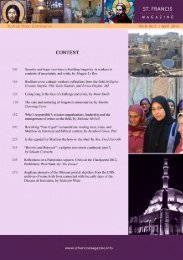download the pdf - St.Francis Magazine
download the pdf - St.Francis Magazine
download the pdf - St.Francis Magazine
Create successful ePaper yourself
Turn your PDF publications into a flip-book with our unique Google optimized e-Paper software.
<strong>St</strong> <strong>Francis</strong> <strong>Magazine</strong> Vol 8, No 4 | August 2012<br />
Hofstede states,<br />
In cultures in which people are dependent on ingroups <strong>the</strong>se people are<br />
usually also dependent on power figures. Most extended families have<br />
patriarchal structures with <strong>the</strong> head of <strong>the</strong> family exercising strong<br />
moral authority. In cultures in which people are relatively independent<br />
from ingroups <strong>the</strong>se people are usually also less dependent on powerful<br />
o<strong>the</strong>rs (Hofstede, 1991, 55).<br />
Hierarchy of a high power distant culture shapes <strong>the</strong> perceived<br />
roles within <strong>the</strong> organization of <strong>the</strong> Persian church. Iranian power<br />
structures tend to be authoritarian; however Iranians are most interested<br />
in reducing <strong>the</strong> power distance and increasing <strong>the</strong> future<br />
orientation aspects of <strong>the</strong> societal culture (Dastmalchian, Javidan,<br />
and Alam 2001, 548). Though <strong>the</strong> church may take <strong>the</strong> structure of<br />
<strong>the</strong> dominant low power distant Western church with a board of<br />
elders with equal authority, old patterns may often surface. My interviews<br />
with pastors and lay leaders of <strong>the</strong> Farsi-speaking church<br />
indicate that form and functionality often did not match. Pastors<br />
who desire to share power with <strong>the</strong> elders often found that <strong>the</strong> elders<br />
didn’t understand fully <strong>the</strong> role <strong>the</strong>y were to play. The elders<br />
took a passive role on <strong>the</strong> elder board consenting to anything <strong>the</strong><br />
pastor proposed. On <strong>the</strong> o<strong>the</strong>r side, elders wanting to share in <strong>the</strong><br />
decision-making process of <strong>the</strong> church often found that <strong>the</strong> pastor<br />
was <strong>the</strong> sole authority, never sharing power with <strong>the</strong> elders. This<br />
misunderstanding of power sharing may be explained in that <strong>the</strong>re<br />
is no collective memory of how an egalitarian rule functions. This<br />
misunderstanding on both sides concerning <strong>the</strong> decision process of<br />
<strong>the</strong> church is ano<strong>the</strong>r element leading to disharmony within <strong>the</strong><br />
Iranian church in <strong>the</strong> diaspora. 18<br />
9.2 Shame and Morality<br />
Shame is a cultural value that deeply shapes Iranians: it may give<br />
insight into some of <strong>the</strong> common reactions indicated in interviews<br />
concerning personal interaction of Iranians in <strong>the</strong> Farsi-speaking<br />
18 Discipleship from pastors and church leaders of <strong>the</strong> host culture may need to take<br />
a proactive role when partnering with an Iranian church plant.<br />
<strong>St</strong> <strong>Francis</strong> <strong>Magazine</strong> is a publication of Interserve and Arab Vision 420







![Reflections on Surah Fatiha and the Lord's Prayer[1] - St.Francis ...](https://img.yumpu.com/49377951/1/184x260/reflections-on-surah-fatiha-and-the-lords-prayer1-stfrancis-.jpg?quality=85)









